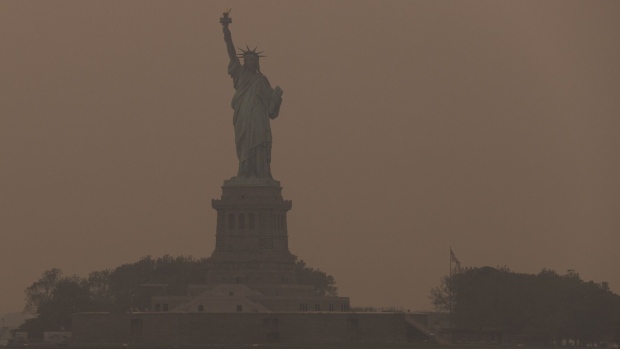Jun 17, 2024
Extreme Heat, Smoke Should Get US Disaster Label, Groups Say
, Bloomberg News

(Bloomberg) -- Activists are petitioning the US government to formally classify extreme heat and wildfire smoke as major disasters, as soaring temperatures threaten to set records across much of the country.
In a petition filed with the Federal Emergency Management Agency, they seek to unlock new funding to help communities address such events before they strike, with money for air filters that strip out smoke and rooftop solar systems that can supply electricity when demand overwhelms power grids.
Climate change has made fatal heat waves more intense and frequent, while hotter, drier conditions stoke the risk of fires that can blanket the US in toxic smoke. An estimated 2,300 people in the US died from heat-related illness in 2023, the hottest year on record. And heavy smoke from wildfires in Canada last year traveled as far south as Georgia, prompting people to shelter inside and canceling flights in some of the largest US cities.
More than two dozen groups — including environmentalists, labor unions and public health advocates — filed the petition Monday, asking FEMA to declare extreme heat and smoke to be “major disasters” under the law. They likened the move to FEMA’s decision to swiftly address the Covid-19 pandemic under the Stafford Act that guides federal emergency response.
“States have been really suffering at the hands of extreme heat and wildfire smoke,” said Jean Su, director of the Center for Biological Diversity’s Energy Justice Program. “With the crescendo of more extreme heat events and more dangerous wildfire smoke, now is the time to acknowledge it, give certainty that states can get money, and to dole out the money so states can finally respond to these crises.”
Other petitioners include the AFL-CIO, the Service Employees International Union and Physicians for Social Responsibility.
Extreme heat can have brutal consequences for workers, who may be forced to toil outdoors in broiling temperatures or forfeit wages. It can also damage infrastructure, warping rail lines and buckling roadways. For decades, heat has been the leading cause of weather-related deaths in the US, while pushing up emergency room visits and health care bills. The impacts fall especially hard on disadvantaged communities who may live in areas dominated by pavement — not greenery — or in housing that’s harder to cool.
“Extreme heat is a harm multiplier that not only makes it harder for residents in poor housing stock to afford their utility bills, but also increases the risk of utility disconnection and even worse health and economic consequences as a result,” the groups say in their petition.
The petition is a first formal step toward encouraging the shift. It can serve as a prelude to litigation if FEMA declines or delays a decision. FEMA rejected requests from states to declare major disasters based on extreme heat in at least three instances in 1980 and 1995, as well as a California bid tied to a heat dome in 2022.
The effort comes amid an unusual early-season heat wave that will send temperatures into the triple digits across parts of the US this week. A heat dome is expected to build above the Mid-Atlantic states, with high pressure trapping sweltering air near the ground.
Although federal aid is often marshaled to help communities in the aftermath of hurricanes, tornadoes and other major disasters, resources can also be made available in times of relative calm. They could, for example, pay for home improvements to protect against heat waves and smoke. The petition filed Monday lists portable air cleaners, high-efficiency windows and building insulation as potential candidates for funding.
Listen on Zero: How Wildfire Smoke Affects Your Health
--With assistance from Brian K. Sullivan.
©2024 Bloomberg L.P.






